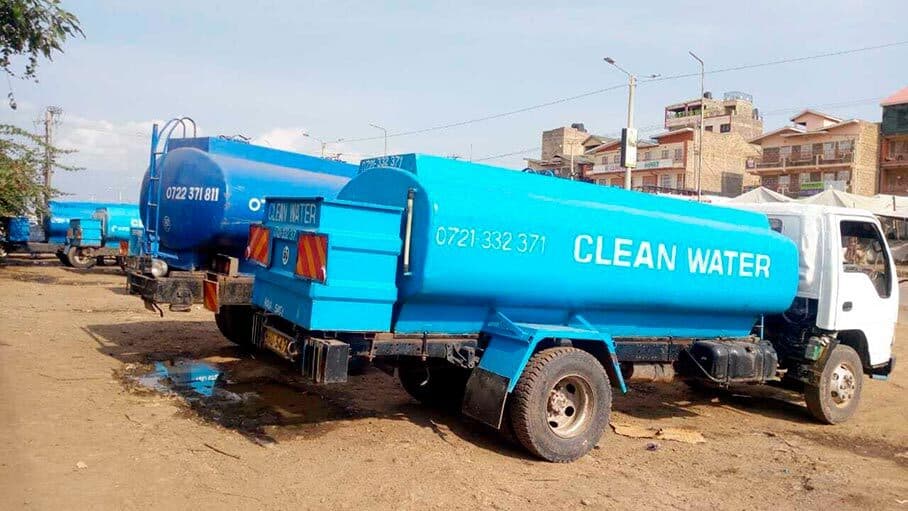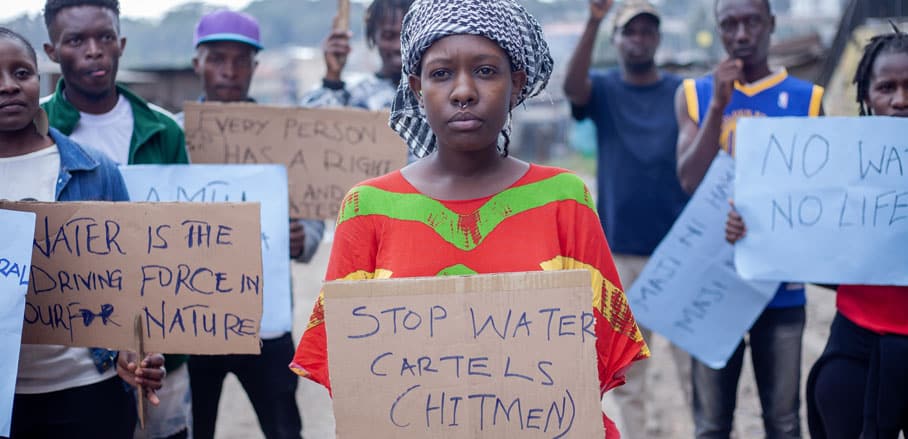Mathare Social Justice Centre Struggles for Clean Water and Sanitation
Access to affordable and clean water cannot be taken for granted in Nairobi’s neighbourhood of Mathare. Gacheke Gachihi outlines the structural changes needed to guarantee affordable water for all.
Since the early 2000s, the struggle to access clean water and sanitation in Mathare has continued to sharpen as the population increases and water demand and uses become more diverse. Today, 70 per cent of Nairobi’s population live in informal settlements, and only 20 per cent have access to piped water and sanitation. I have lived in Mathare since the 1990s. Then, water was accessible through the Nairobi City Council taps, although it was not adequate and accessibility had decreased in comparison to the 1980s. What followed was an era of perennial water shortage in the early 2000s.
What Were the Negative Outcomes of Water Privatisation?
The structural adjustment programmes (SAPs) imposed by the International Monetary Fund (IMF) and the World Bank demanded the privatisation and commercialisation of water. The privatisation of water compounded with corruption, and water cartels continually created a chronic water shortage in Mathare and the broader Eastlands of Nairobi. Areas that have been given the name “informal” or “slums” and were maintained as such have been intentionally neglected by the government in providing basic needs such as clean, safe, and adequate water and sanitation provisions.

© Gacheke Gachihi
Water policies, which were imposed by the IMF and the World Bank to commercialise water, created mafia-like water cartels in the water supply system that caused an artificial shortage in Mathare, Kayole, Dandora, Ruai, Umoja, Githurai, and many other informal settlements. Residents of Mathare have been left to rely on private suppliers that have mushroomed in the informal neighbourhood, selling and hawking water with lorries and tanks following the laws of demand and supply. Privatisation has created conditions leading to misery and poverty, caused by the uneconomical cycle, high prices, and continuous exposure to water-related diseases: clogged and contaminated water pipes that harbour cholera, typhoid, and COVID-19.
For the past 20 years, this has continued to spark protests, in Mathare and elsewhere, as part of the multifaceted struggles for social justice: the demand for water, as a basic need, guaranteed by the Constitution of Kenya under Article 43: ‘Every person has a right to clean and safe water in adequate quantities.’
Since 2018, residents from a variety of neighbourhoods in the Eastlands have been coming together in the Mathare Social Justice Centre (MSJC) to think through various approaches that can be applied to demand for water collectively as a community. MSJC resolvedly conducted a participatory action research on the demand for the right to water in the Eastlands, named “waterless scars”. The report exposed the cartels and criminal networks that have taken over the water systems and infrastructure, consequently corrupting water institutions.
Water Access in Mathare
The participatory action research conducted by MSJC in 2018 and the campaign against unsafe and inaccessible water, dubbed majiniuhai, majinihaki (“water is life, water is a right”), outlines the very dehumanising conditions of the water situation in Mathare. They give detailed accounts of persons living in informal settlements and their struggle for water and basic social and economic rights.
According to the report, over 50 per cent of those who responded to the questionnaire have suffered from water illnesses.
“In a day, a local clinic in Mathare sees 15 people affected by cholera, and around 200 who have been infected by typhoid. This is in stark contrast to the 13 people we spoke with from more prosperous neighbourhoods, none of whom have ever contracted any illness from drinking or using water. Community members also struggle with basic household activities such as cooking and cleaning. One mother told us that there have been many times when she has had to choose between doing dishes and washing her baby. Unfortunately, this is the reality that many people in Mathare have to grapple with every day.”
Life has become very expensive, managing a meagre income to buy water, pay rent, and eat; illnesses like cholera, malaria, and bilharzia are common because of unsafe water in Mathare and its neighbourhoods. One resident in the report notes,
“House rent, water and you need to eat? No, all this is really weighing people down, especially the low-income earners. You stay even for two weeks without water and the government expects you to survive without this basic need. We are paying taxes, are we lesser beings or what?”
In August 2017, the water situation in Mathare exacerbated ethnic conflicts during the general election, as there was no water in Mathare except in the 4A and 4B areas, which “belonged” to one ethnic community. The price of a 20-litre jerry can increased from Ksh.10 to Ksh.50 and even to Ksh.100 along the Mathare River stretch, downstream. The “ethnic” conflict resulted in violence and human rights abuses against women and children.
How Can Affordable Water Access Be Realised?
MSJC recommends and demands the following in order to realise affordable water access in Mathare and other informal settlements:
- Restructure the system to make sure that water is not privatised and is accessible to all.
- Shut down bottled water companies since they are cartels.
- Build safe, secure, and adequate piped water networks in all marginalised neighbourhoods in Nairobi and in other counties, and close all cartels associated with the Nairobi City Water and Sewerage Company.
- Distribute water according to population density and not according to wealth.
- Improve and increase sanitation facilities in all marginalised neighbourhoods to prevent diseases like cholera and typhoid.
- Provide free health care services for those affected by inadequate and dirty water, sanitation, and sewage infrastructures.
- Improve water policies, comprehensively implement the current water legislation, and include strong people-centred accountability mechanisms.
- Install fire hydrants in all marginalised neighbourhoods with frequent fires.
- All water bodies should have at least three representatives from poor urban settlements on their board. These should include a woman, a community activist, and a person with a disability chosen by the community.
- Impeachment of all presidents, governors, and water company CEOs who do not implement article 43 of the Kenyan Constitution.
